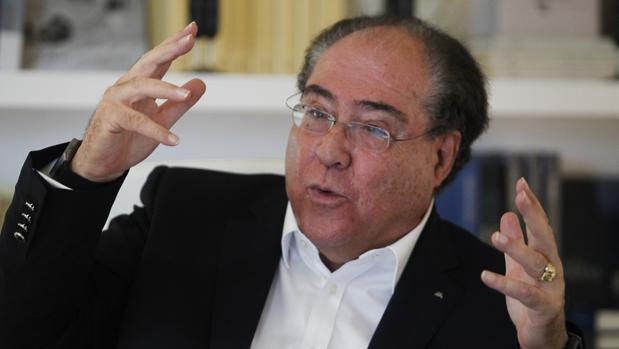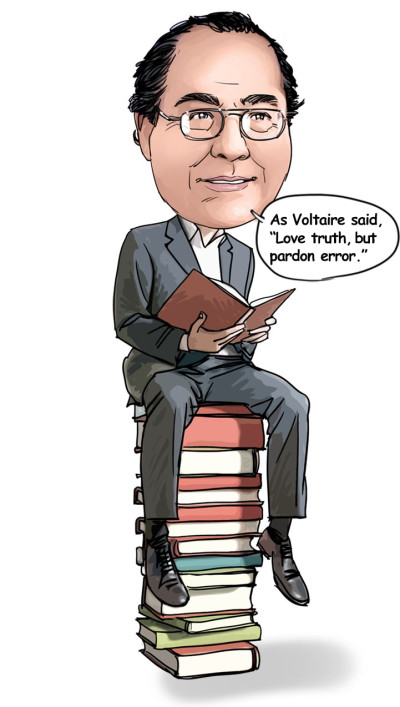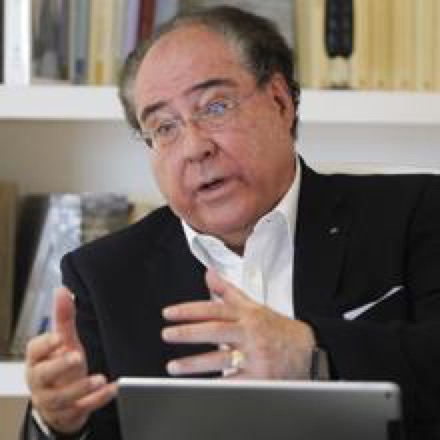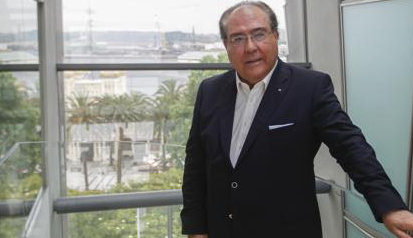
- June 1, 2019
- Education, HigherEd Theory & Praxis, Humanities, Interviews, Psychology, Social Philosophy, University
This not a standard interview but rather a master class on life and society from the educational, sociological and cultural prism. It’s an hour of conversation with a humanist.
Interview by José Luis Jiménez, Diario ABC – Spain
Behind his deep and serene tone of voice Miguel Ángel Escotet hides a life dedicated to university education and social and psychological research. The current president of Afundación and general director of the CSR of Abanca treasures an extensive trajectory in education: professor in North American campuses like Nebraska, Florida, Colorado or Texas (of whose College of Education he was dean), in politics (vice minister in the seventies in Venezuela and Special Advisor to Director General of UNESCO in Paris) and in culture (Secretary General of the OEI). Sharing a conversation with him is doing it with someone who claims to feel himself “a citizen of the world” after a life as a successful emigrant.
— You defend the importance of ethics and aesthetics in society. Do we live in an unethical world devoid of an aesthetic sense?
– The two most important components of life are knowledge and beauty. Science is a consequence of ethics. To understand aesthetics, you have to understand ethics. But unlike what we can call hard sciences, which are learned through very structured methodological processes, Ethics is not learned in books. Ethics is a process that is learned by example. When we speak of a society of corrupt politicians… it is even greater corruption that one student plagiarizes another! A teacher who teaches when he knows he is not teaching what should be taught is also corruption!
— Is capitalism ethical?
– It is ethical if you share. If not, if it is only accumulation. If I generate wealth and help others to generate it, it is different from amassing it to store all for myself.
— That is, the economy can have morals.
– The economy must have it.
— The moral says that societies should be open to accept migratory flows. The economy replies that the costs involved may not be sustainable. Moral or economy?
– Nobody wins. The problem of emigration, and I have emigrated all my life, is that we do not understand that for a person it is very difficult to live in a country that is not theirs. People migrate because they do not have the social or personal or economic conditions for his personal development. I did not leave for economic reasons, but I did think that what I could do elsewhere could not be possible in Spain. I would have liked to have done in Spain what I did in America. Emigration has a basis here: we have been unable to improve the economic system of the countries of origin. However, there is a healthy emigration that is the exchange, that helps people to be less provincial. All the displaced people that we have in the world for political reasons must be received, but at the same time we must fight against the ignominy they are fleeing from, there we have the ethical factor. And we are reluctant to face that.
— How do you see, as a successful emigrant, what is happening in Europe in recent years?
– I see on one side, a very selfish attitude, and, on the other hand, a very irresolute attitude to promote the change of conditions in the countries of origin. I cannot understand how it is allowed, in this age of technologies and GPS, where Google goes to your home, that mafias continue to use migrants. The problem of emigration is a gestalt: it is not solved attacking a part but facing the whole.
«The anti-migratory discourse is tremendous and impossible to maintain by putting up barriers. It is like themeasles and we will pass it soon.»
— Do you share this diagnosis for another big scenario with migration problems for your United States? Could you ever imagine that your adopted country would embrace this anti-migratory discourse?
– The anti-migratory discourse is tremendous, and it is impossible to maintain barriers of one size or another. I have lived alongside those barriers and fought against them. In the history of mankind there are turning points. And as a society, we must prepare for when it ceases to exist or arm ourselves to fight democratically. Never sit back and wait for a solution.This anti-migratory speech is like a measles. And we will pass it soon. The human being, in the face of injustice, reacts. And we must react by educating others and ourselves, so that these phenomena become increasingly unappealing to all.

Miguel Ángel Escotet- Photography by IAGO LÓPEZ
—Your specialty is the university world. Have we distorted the university by turning it into a mere instrument to train workers?
– The big problem we have in education, not in all countries, is that we have uniformed the university: same degrees, same studies, same type of teachers… diversity is deficient. Uniformity is the greatest obstacle to creativity. I would say that there are universities that could dedicate themselves to education, to research, to both, with different specialties… But, reproducing already existing models goes against innovation.
— What do we do with the Humanities?
– It’s another serious problem facing universities. Education has to return to the Renaissance, to that person who knew everything and understood both languages, the scientific and the humanistic. The quid of the matter is that decisions, even if they are taken in the scientific field, are, at the same time, human decisions. And to know the human being, it is necessary not only study him through mathematics, but through philosophy, psychology, art… Does it mean a longer schooling? Sure, of course.
— But, have not we privileged a utilitarian vision of knowledge?
– Yes and no. I do not believe in one stage to study and another to work. The two go hand in hand. Life is that. At my age I continue working, studying and learning. And there is time to have fun too. But we have been very prone to the fragmentation of knowledge, saying that this is useful, and this is not.
— When you tell  me that we have to return education to the Renaissance, is it a realistic proposal?
me that we have to return education to the Renaissance, is it a realistic proposal?
– I think so. I believe it is totally realistic. The university does not have to deviate from society. We have to worry about educating a human being with the concept of multitasking. We have to integrate everything we do. A society with a university away from it, creates insertion problems. Having a totally theoretical education goes against what knowledge represents.
— A chair or tenure is a certificate of wisdom?
– Not at all. There should not be tenured professors. Tenure should be renewed every year. I do not want to generalize, but there is a large majority of professors that stopped learning the day they got tenure. The problem has to do with the fear of losing your job. In the university there are many people without a vocation as a teacher, who have gone to that field for reasons other than vocation. And the university is not an area of mercenaries.
«There should not be tenured professors. A large majority of professors stopped learning the day they got tenure. It has to do with the fear of losing your job.»
— I have read articles in which you talk about “online education”. It is the future?
– I am very critical of online education. I accept it whenever the institution is able to include within online learning the concept of academic socialization, which is not an education in isolation but in companionship. It was always my discourse. Online education has not achieved that yet, it is still a solitary student institution. Even the conventional university is excessively individualizing. I also say: there can be much more distance in classrooms between the teacher and his or her students than between an education by phone between Japan and Spain.
— Does the Bologna model work?
– In the beginning, the goal was to try to articulate teachings and programs. Something has been done in that aspect. But on the other hand, the system has being uniformed too much. It always caught my attention in the United States: when you go there to pursue other studies, your title is not validated, what they want to know is your education, your skills, your intellectual maturity. This is very important. They do not worry so much about how many credentials the student brings, but the ones that accredit your relevant experience, academic and profesional. The Bologna model have tried this, and something has been achieved.
— You have introduced the theme of the American university. You come from the University of Texas, a center that has seven Nobel prizes. Is success measured in awards?
– No, no. As dean of my college, we were one of the first public Texan institutions in the area of education to receive national accreditation. And we did not have Nobel prizes. That is part of marketing, having figures that often do not teach, that many professors do not even know. That is an effect to attract students. The important thing is the regular professor. At Harvard it is very easy to turn a student into a successful person, because Harvard makes the easiest part: to manage talent. The important thing is to go to another university, which can be in Minnesota or Virginia, with regular people from urban or rural settings, and convert a student with limited resources who studies with a loan and turn the student into a successful person. That has a lot more value.
Escotet, during the interview- Photographer IAGO LÓPEZ
 —There are universities in the USA such as Yale, Harvard or Princeton where they only want the best. Is it an elitist philosophy?
—There are universities in the USA such as Yale, Harvard or Princeton where they only want the best. Is it an elitist philosophy?
No,although I do not like it, I return to the concept of diversity: there is something for everyone. The one in Texas is a public university. In Texas there is a large proportion of students of Mexican origin with very limited income. The fact that there are smaller universities that have students of a unique quality should not affect us. The problem is not to differentiate between public or private universities, but between good and bad institutions. Let’s emphasize that. There are public universities where we know that titles were given away. If something like that happens in a private institution, it is very possible that they get closed!
“I do not think Harvard is the best education, and I know it. These are myths. I would never send a son of mine to Harvard in some specialties.»
— At the end this idea of great universities that only want the best, leads to wonder if they assume the idea that only the best deserves the best education.
– It’s a terrible philosophy, but besides, I do not think Harvard teaches the best education. And I know it. This is a matter of myths, of institutions that live at the expense of their legend, of having once been a beacon in education. I would never send my child to Harvard in some specialties.
— Another very American idea, the competition between students. Is it educational to seek a confirmation of who is better or worse?
– This is an important issue that has its origin in a bad orientation since childhood. It is a consequence. You have to educate to compete, but with yourself. If someone has to do something, he or she cannot do it by looking at the neighbor, but one has to establish his or her own goals. Extrapolated to the university, it is the same. USA is a very interesting country. There is competition but there is also great cooperation. In the American university, people cooperate and do not copy themselves, because there is integrity. Who introduces the competition in modern education is the model of exams based on grades and grading systems. This system is harmful. The number, the position is evaluated, and the real knowledge is not truly evaluated.
— I’m going to ask you take a risk in a very controversial situation here. Does Galicia need three universities or a large and prestigious one?
– It’s the same to me. What you need is a system and that it works as such. Whether it’s three, five or one is the least. There are universities that have a campus there and another here, and that is not necessarily better or worse. A system is needed where cooperation is mandatory: laboratories, classrooms, libraries, teachers… Everything should be shared by the universities. I would say that decentralization is good when working together.
— Another of your essays defends education for uncertainty. The economic crisis had not already forced us to that?
– Economic crises have been with us for centuries. Sometimes we forget what change entails. The problem of educating for uncertainty is that it means to educate for what is unknown. Nobody is taught what the person’s attitude is when a loved one dies. How do you react? And we go back to the beginning. The school teaches you knowledge only about real facts, and not about utopian facts. And I believe that the study of facts must be done on both situations. We must teach students to handle themselves in scenarios that have not occurred. It is very easy to educate to solve problems that have already been solved.
— And how do you educate for uncertain scenarios?
First educating teachers who do not have that education. Then, educating parents. There are times when what you learn in school you unlearn in the street or at home, and vice versa. I believe in the lengthening of study hours. If we achieve that learning be considered a pleasurable task, embraced with enthusiasm and passion … Hence, the importance that children, before the age of nine, acquire a taste for knowledge. If that is not taught, everything else is very difficult. For example, where is the training in psychology or art of elementary school teachers? We need teachers and specialized professors, but also a generic education is very important.
— You are talking almost of a humanist teacher
– Not only that, but also the most qualified of the whole system. We give more status to the university professor than to the teacher, and the teacher should earn more and have better preparation than the tenured professor.
“When they appointed me vice minister, my father called me and said: You can enter with glory, but the important thing is to go out with it»
— I read you in an interview that you managed to pay in part for your Ph.D. by working at a gas station in Lincoln, Nebraska at -40º. Have we lost the culture of sacrifice?
– We lack the culture to think much more about others and less about oneself. That has to do with sacrifice. We tend to do things without great effort. One cannot develop sustainability skills as a person if one is not able to think that if today we are up, some other day we may be down. I was vice minister of education of Venezuela. My father called me and he congratulated me, but he warned me that I would not be Vice Minister all my life. «You can enter with glory, but the important thing is to go out with it,» he told me.
— Has the Welfare State anesthetized us?
– I do not believe in the Welfare State. We all have the right to education, health and basic services. But we all also have duties. The Welfare State presupposes that the important thing is rights and leaves aside the obligations. We would be better off if we created a State with the same proportion of rights and duties.
— The patronage, does it need a law or a strategy of pedagogy and business awareness?
– Sometimes the world works better without laws, which end up being corsets. I always said that university legislation should have a single article: compel universities to change without pause. The current system prevents change, and education is to change, to innovate. A law may compel the employer or the company, but I want them to be convinced that it is fundamental to give to society what society has given them. That factor of conviction needs involvement. The concept of benefactor does not only define the one who gives, but the one who gets involved.

Escotet, at the headquarters of Afundación, in the canton of A Coruña – Photographer IAGO LÓPEZ
— About to turn four years in charge of Afundación. Satisfied with what has been achieved?
– Very satisfied. Although banking is not my specialty, I think I have something to say in the field of culture, science and education. This CSR foundation has been oriented from a type of institution that had the concept of giving without any direction, to another oriented to important axes for Galician society, such as active aging, culture and higher education. Without covering everything, because sometimes it ends up grasping little. And taking care not to worry more about the continents than about the contents. There is so much to do. These institutions should never finish their task.
«Institutions like Afundación should never finish their task; There is so much to do»
— You are talking about active aging. Do we take the experience of our seniors as a society?
– Not at all. We do not know how to use the experience linked to the new social forms. Older people also do not use their own experience to reconstruct it based on current society. There is a kind of system that, at a certain age, they stop learning. It is for me a very interesting idea to have grandparents’ schools or that prestigious professionals would not retire at such an early age. There are so many possibilities for the elderly, and it seems as if society parks them.
— Is this a rejection of the old a cultural issue?
– It is lack of education of the young as well as of the older people. There are societies that give major importance to the elderly in the development and conservation of culture to perpetuate it and avoid its falling into oblivion. In a century and a half, we have lost 5,000 of the 6,000 cultures that were believed to exist. At this rate we will end up like in Orwell’s world. We have a great intergenerational problem.
— The Abanca Resuena, within the cultural field, is one of his most beloved projects …
– It is because music is a language, not only has to be seen as an entertainment activity, but an aesthetic activity that can go hand in hand with ethics. We know that music as a language helps the development of affective and cognitive skills, something that not all areas of science achieve. Music has very important elements in the development of societies, be it classical or of any other kind.
— What objectives does Afundación have pending?
– To have an exemplary excellent university institution in Spain which complements Galician and Spanish higher education. To make culture more active, not only to exhibit cultural performances and do them from a point of view of contemplation; we want to go towards an active participation. And in active aging, we would have to work supporting research from an integral perspective, covering the medical, psychological and educational. I have always been excited by the idea of a school for the elderly, not designed for degrees and certificates, but for learning.
– Will the improvement of the Afundación financing model give them a greater margin of action?
– Of course! All the programs we had were doing well, but the limitation were given by the means we had. There are other cross-cutting areas that we have developed this year for the first time, such as those of institutional social responsibility from Abanca. We have volunteering actions, business forums of responsible corporations, financial education activities, La Coruña and Vigo technical schools… We want to introduce in Spain a pioneer program in digital skills, a post-secondary education between technical schools and university, that can help people to develop these skills.
——————————
This interview was originally published in Spanish in the ABC newspaper of Spain, on Sunday, July 8, 2018. Its original Internet version of ABC can be viewed here.
©2018-2019, Diario ABC and Miguel Ángel Escotet. All rights reserved. It can be reproduce by citing the source and the author as follows: Escotet, Miguel Ángel (2018). Interview with Miguel Angel Escotet: «The primary teacher should earn more and have better education than the university professor.» Diario ABC (Madrid) Galicia Edition, July 8th, pages 70-71. (English translation).